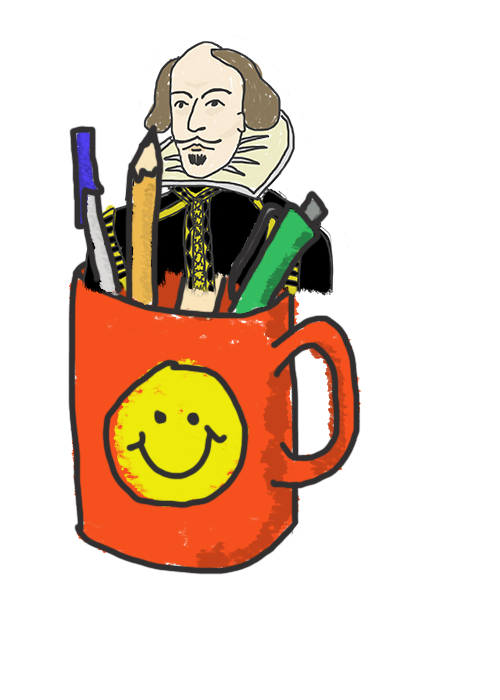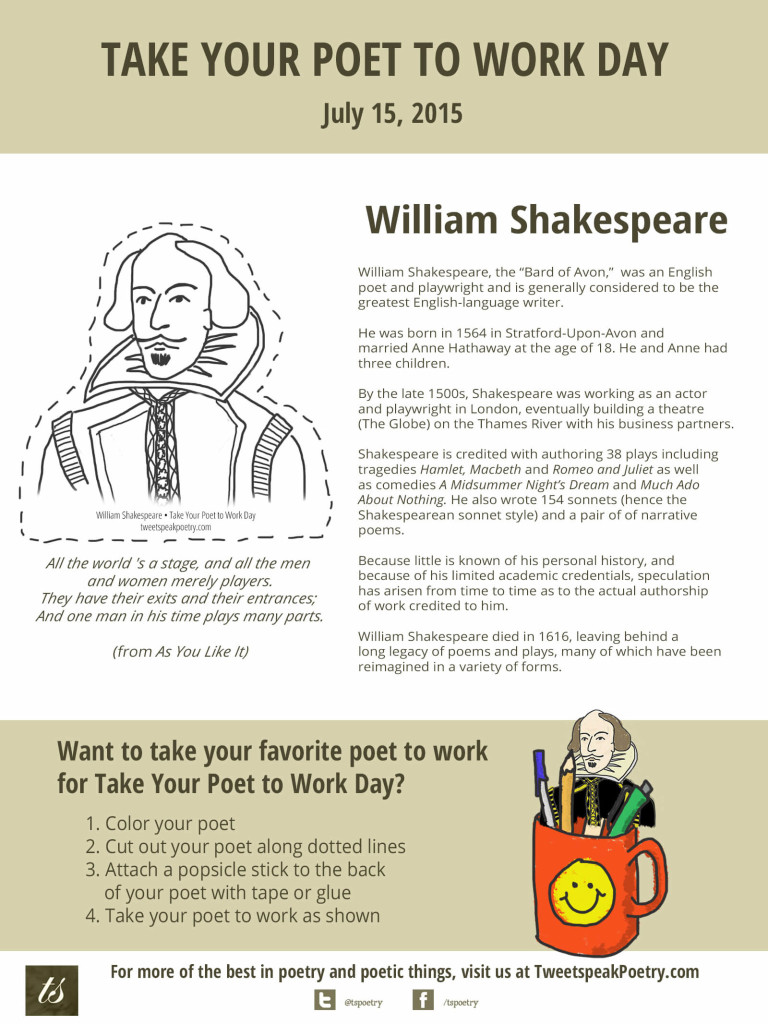
Take Your Poet to Work Day is coming July 15
To help you play and celebrate with us, we’re releasing poets each week in a compact, convenient format you can tuck in your pocket, tool belt, or lunchbox. We started our celebration two years ago with Sara Teasdale, Pablo Neruda, T. S. Eliot, Rumi, Edgar Allan Poe, and the reclusive Emily Dickinson (for folks who work at home). We even released a full collection, The Haiku Masters: Matsuo Basho, Yosa Buson, and Kobayashi Issa. And last year, we added Langston Hughes, Adrienne Rich, John Keats, William Butler Yeats, Christina Rossetti and the beloved 20th-century American poet, Sylvia Plath.
Because you can never have too many poets in your lunch box (or your desk drawer), we have a new collection of poets to release this year, beginning with the Bard of Avon, William Shakespeare.
Take Your Poet to Work: William Shakespeare
Get your own downloadable version of Take Your Poet to Work Day William Shakespeare Printable that you can print, color and cut out for the big day.
William Shakespeare, the “Bard of Avon,” was an English poet and playwright and is generally considered to be the greatest English-language writer. He was born in 1564 in Stratford-Upon-Avon and married Anne Hathaway at the age of 18. He and Anne had three children.
By the late 1500s, Shakespeare was working as an actor and playwright in London, eventually building a theatre (The Globe) on the Thames River with his business partners.
Shakespeare is credited with authoring 38 plays including tragedies Hamlet, Macbeth and Romeo and Juliet as well as comedies A Midsummer Night’s Dream and Much Ado About Nothing. He also wrote 154 sonnets (hence the Shakespearean sonnet style) and a pair of of narrative poems. Because little is known of his personal history, and because of his limited academic credentials, speculation has arisen from time to time as to the actual authorship of work credited to him.
William Shakespeare died in 1616, leaving behind a long legacy of poems and plays, many of which have been reimagined in a variety of forms.
Sonnet 130: My mistress’ eyes are nothing like the sun
Sonnet 33: Full many a glorious morning have I seen
Learn more about Take Your Poet to Work Day and our featured poets
Discover more Poets and Poems
Explore more William Shakespeare
Post and illustrations by Will Willingham
________________________
Take a poet to work every weekday morning with a subscription to Every Day Poems, the most beautiful and convenient way to read a poem a day
Buy a year of Every Day Poems, just $5.99
- Earth Song Poem Featured on The Slowdown!—Birds in Home Depot - February 7, 2023
- The Rapping in the Attic—Happy Holidays Fun Video! - December 21, 2022
- Video: Earth Song: A Nature Poems Experience—Enchanting! - December 6, 2022


L.L. Barkat says
I love his ruffles 🙂
Ann Kroeker says
My daughter is going to a Shakespeare festival later this summer with students from school, and then is planning to sign up for a college-level Shakespeare class in spring. She’s excited about it. I tried to make Shakespeare accessible to my kids from early on; at the very least, I wanted the story lines of the plays to feel familiar.
During the 2012-2013 and 2013-2014 school years, the high school writing class I taught tried composing Shakespearean sonnets. For teens unfamiliar with the sonnet form, I was impressed with the results.
Will Willingham says
Ann, I was just reading this article today as I was preparing for the Top 10 to run tomorrow, and found it so interesting the way that Shakespeare has been made to be intimidating because the work has been approached as something to “study” and not something to enter into. Something we talk about around here with poetry in general, really.
But I did get a chuckle out when the writer said it shouldn’t be that hard, really. It’s just early modern English, not late Middle English.
Of course. That changes everything. 😉
http://www.telegraph.co.uk/culture/hay-festival/11640653/How-Shakespeare-invented-unfriend-400-years-before-Facebook.html